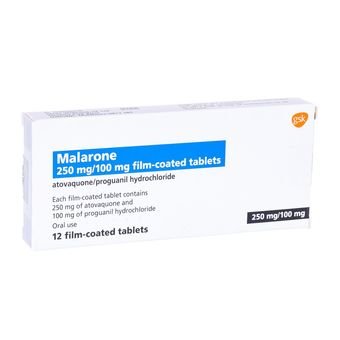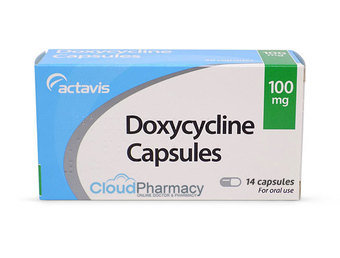Malaria & Malaria Prevention

More information
Introduction
Malaria is a serious disease that is prevalent in certain parts of the world — typically in tropical and subtropical climates. The disease is spread through mosquito bites.
If malaria isn't diagnosed and treated quickly, it can potentially be fatal. Therefore, it's important to be aware of the symptoms, especially if you are travelling to places that are high risk.
The symptoms typically develop within 10 days to 4 weeks of contracting the infection, however you can find that the infection can lie dormant for a long time (sometimes up to several months) before symptoms begin to show.
Symptoms include a high fever, excessive sweating and chills or shakes. You could also notice stomach problems like vomiting, diarrhoea and abdominal pain, and in extreme cases, it can cause a coma.
Treatments
More information
Once an online consultation has been been approved by our medical team, our pharmacy will safely prepare and ship your treatment to you in discreet packaging using Royal Mail or DPD.
What Is Malaria?
Malaria is a disease that is spread to humans through mosquito bites.
Every year, millions of people are infected with malaria, and the disease is responsible for hundreds of thousands of deaths. In 2021, the WHO estimated that there were 241 million cases of malaria globally and that in 2020, there were an estimated 621,000 deaths from malaria.
Africa has the most Malaria cases — the continent accounted for 95% of malaria cases and 96% of malaria deaths in 2020. Malaria is also present in Central and South America, areas of the Middle East, and some Pacific islands.
Malaria is caused by a parasite — an organism that lives on or in a host organism. The parasite is passed to humans when they are bitten by an infected mosquito.
Malaria Symptoms
It's important to be aware of malaria symptoms especially if you're travelling to any areas where there is a higher risk of the disease.
The symptoms of malaria include:
It is typical for people with malaria to have ‘malaria attacks’ in cycles. These attacks can begin with chills and shivering, followed by fever and sweating, before body temperature returns to normal.
Symptoms of malaria usually begin a few weeks after a bite from an infected mosquito but can develop in as little as seven days. Some malaria parasite types lie dormant in the body for as long as a year (and occasionally, even longer).
How Is Malaria Spread?
Malaria is most commonly spread by the female Anopheles mosquito. Only this type of mosquito can transmit malaria.
The mosquito is infected via a blood meal previously taken from an infected human, which contained microscopic malaria parasites. When the mosquito bites another human, these parasites mix with the saliva of the mosquito and are ‘injected’ into the person’s bloodstream.
As the malaria parasite is present in an infected person’s red blood cells, it can potentially be transmitted through an organ transplant, blood transfusion or sharing contaminated needles.
Mothers can also transmit malaria to their unborn babies before, or during, delivery. This is known as congenital malaria.
How Does Malaria Affect the Body?
Initial symptoms of malaria can include chills, fever, headache, nausea, vomiting, diarrhoea, muscle pain, and other symptoms outlined in the malaria symptoms section above.
Malaria can also cause severe anaemia. The malaria parasite can destroy red blood cells, meaning that there isn’t enough oxygen being carried to body tissues. This can cause the infected person to feel faint, drowsy and weak.
In some cases, it may cause jaundice and liver failure too — a condition in which the skin and whites of the eyes turn yellow.
If malaria is not treated promptly, the infection can increase in severity, causing:
- Seizures
- Confusion
- Coma
- Kidney failure
- Death
How Long Does Malaria Last?
Symptoms are present in 48-hour cycles with some types of malaria. Within these cycles, you may be cold and be shivering before developing a high temperature, sweating and feeling tired. The symptoms in these cycles typically last between six to 12 hours.
It generally takes around two weeks of treatment to recover from malaria completely. A full recovery from malaria is dependent on getting the right treatment.
Malaria Diagnosis
Malaria is typically diagnosed through blood tests, as well as a review of any recent overseas trips you have made and your medical history. You will also undergo a physical examination.
Blood tests can show:
- The presence of a malaria parasite
- The type of malaria parasite
- If the disease has caused any complications
- If the parasite that caused your infection is resistant to some drugs
While the results from certain blood tests are available in just a few minutes, it could take several days for some blood tests to be completed.
When there are potential complications, further diagnostic tests may be ordered.
Malaria in Pregnancy
It is advised that pregnant women should avoid travel to parts of the world where there is a high malaria risk.
Pregnant women are at more risk of developing serious complications than women who are not pregnant. These complications include pregnancy problems such as low birth weight, premature birth, stillbirth and miscarriage. There is also an increased risk of the mother dying.
If you are a pregnant woman travelling to an area with a high malaria risk, you should speak to your doctor. They may advise that you take antimalarial medication.
How to Prevent Malaria
If you are visiting an area with a high malaria risk, highly effective antimalarial medication such as Malarone tablets or Doxycycline tablets is normally recommended. These tablets can reduce the risk of getting malaria by around 90%.
Which type of antimalarial tablets you are prescribed can vary according to factors such as the area you are travelling to, your medical history, any allergies you have, and your family’s medical history. They will also take into account whether you have experienced problems with taking antimalarial tablets previously, whether you are pregnant, and your age.
In some cases, you will be advised to take a trial course of antimalarials prior to travelling. This is done to check that there are no unwanted side effects or adverse reactions. For cases in which unwanted side effects or adverse reactions are experienced, alternative tablets may be prescribed before you travel. Please visit our travel health page for more information.
At Cloud Pharmacy, we can help you find the antimalarial tablets that are right for you.
Treating Malaria
If you have malaria, you will typically be given a prescription medicine that kills the parasite.
The type of drug you take, and how long you take it, will depend on several factors including which malaria parasite you have, how severe your symptoms are, whether you are pregnant, and your age.
Among the common antimalarial drugs is chloroquine phosphate, which is usually the favoured treatment for parasites that are sensitive to it. However, in some regions, parasites are resistant to the drug, meaning it is not an effective treatment.
In these cases, artemisinin-based combination therapies may be used. These are a combination of several drugs that combat the parasite in different ways. These treatments — such as artesunate-mefloquine and artemether-lumefantrine — can be effective in treating types of malaria that are resistant to chloroquine.
Other antimalarial drugs include:
- Atovaquone-proguanil – also known by its branded name, Malarone tablets, this drug can both prevent and treat malaria and is typically used in countries where malaria is common
- Quinine sulfate with doxycycline – Doxycycline tablets (also known as the branded Oracea or Vibramycin) can be used to prevent malaria. When combined with quinine sulfate (also known as the branded Qualaquin) can also treat malaria
- Primaquine phosphate – primaquine is used to follow other medications like chloroquine. After the other medication has killed the malaria parasites that are living in red blood cells, primaquine kills malaria parasites in body tissues to prevent the infection from returning
Guides
How it works
First...
Complete a quick eligibility check
Then...
Order your treatment
Finally.
Fast, confidential delivery to your door





















